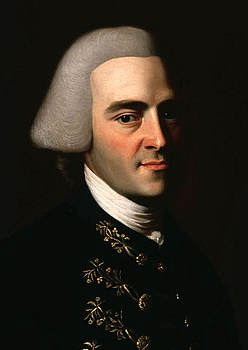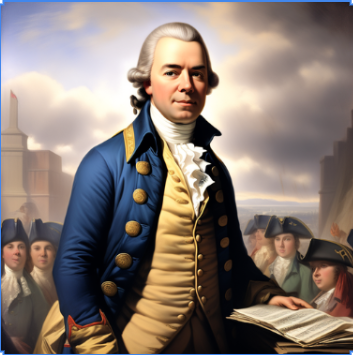John Hancock: Founding Father and Statesman of the American Revolution
John Hancock, a prominent figure in the American Revolution, was born in 1737 in colonial Massachusetts. Widely recognized for his pivotal role in the nation's founding, Hancock became one of the most influential figures during a crucial era in American history.
Casey Adams
12/4/20234 min read


Early Life and Mercantile Rise
John Hancock was born in Braintree, Massachusetts, into a modest family that was lifted into affluence when young Hancock was adopted by his childless uncle, Thomas Hancock—a prosperous Boston merchant.
Under his uncle’s guidance, Hancock was groomed not only for business but for high society.
After graduating from Harvard College in 1754, he became a partner in the lucrative Hancock mercantile firm and inherited the business upon his uncle’s death in 1764.
By his early 30s, Hancock was one of the wealthiest men in the Thirteen Colonies.
His wealth would provide personal comfort and later serve as financial ammunition for the American cause against British control.
The Path to Revolution
Though Hancock’s rise was rooted in commerce, the 1760s dragged him into colonial politics as tensions between the colonies and Great Britain intensified.
He became a protégé of Samuel Adams, one of Boston’s most vocal critics of British policies.
A pivotal moment came in 1768 when British customs officials seized Hancock’s sloop, Liberty, under the charge of smuggling.
Though the charges were eventually dropped, the incident catapulted Hancock into colonial fame.
Many colonists saw the seizure as an unjust abuse of British power, and Hancock’s resistance made him a folk hero of early resistance.
Despite historical debate about the accuracy of his reputation as a smuggler, the episode solidified his role as a symbol of defiance.
Leadership in the Continental Congress
Hancock was elected as a delegate to the Second Continental Congress in 1775 and quickly rose to prominence, succeeding Peyton Randolph as its president.
While his presidency was largely ceremonial—day-to-day decisions were handled by committees—Hancock’s affable personality, immense popularity, and personal fortune gave him significant influence.
Most famously, Hancock was the first to sign the Declaration of Independence on July 4, 1776.
His signature—bold, stylized, and unmistakable—has become an enduring symbol of American freedom.
Today, the term “John Hancock” is colloquially used in the United States to mean a personal signature.
Military Aspirations and Political Disappointments
Hancock longed for a more active military role during the Revolution, at one point aspiring to lead the Continental Army.
However, the position ultimately went to George Washington, a decision that reportedly bruised Hancock’s pride. Nonetheless, he continued to support the war effort politically and financially.
After leaving Congress in 1777, he returned to Massachusetts, where he resumed leadership roles, including involvement in the state militia and the state constitutional convention.
Governor of Massachusetts
John Hancock served multiple terms as Governor of Massachusetts, first from 1780 to 1785 and again from 1787 until his death in 1793.
His governorship was marked by populist policies and efforts to stabilize the post-war economy.
A crucial moment came in 1788, during Massachusetts' heated debate over whether to ratify the newly proposed U.S. Constitution.
Many Anti-Federalists opposed the document, fearing it granted too much centralized power.
Hancock used his prestige to broker a compromise: he would support ratification if the Constitution was amended with a Bill of Rights.
This position helped tip the balance, leading to Massachusetts' approval and paving the way for other hesitant states to follow suit.
Legacy and Historical Significance
John Hancock’s legacy rests not just in his famous signature but in the role he played in shaping American independence and governance.
His transformation from elite merchant to revolutionary figure captures the spirit of the American Revolution: a blending of personal ambition, political ideals, and social transformation.
He was a man of contradiction—rich yet populist, ambitious yet often sidelined, beloved yet occasionally divisive.
His relationships with contemporaries such as Samuel Adams, George Washington, and others reveal the complex network of personalities that forged a new nation.
Above all, Hancock is remembered as a man who stood visibly and proudly for independence at a time when doing so could have cost him everything.
His signature was not just a flourish of ink—it was a declaration of resolve.
Conclusion: More Than Just a Name
John Hancock’s name endures because he dared to make it so.
At a moment when silence or neutrality might have preserved his fortune and status, he chose to be a voice of revolution.
Through his political leadership, financial support, and iconic signature, Hancock left a legacy that continues to shape American identity.
In a world still grappling with the balance between liberty, governance, and personal rights, John Hancock’s story remains deeply relevant—a testament to the power of principled leadership and patriotic action.
Chernow, Ron. "Alexander Hamilton." Penguin Books, 2004.
Flexner, James Thomas. "Washington: The Indispensable Man." Back Bay Books, 1994.
Ellis, Joseph J. "Founding Brothers: The Revolutionary Generation." Vintage Books, 2002.
Ferling, John E. "A Leap in the Dark: The Struggle to Create the American Republic." Oxford University Press, 2003.
McCullough, David. "John Adams." Simon & Schuster, 2001.
Miller, John C. "Samuel Adams: A Life." Penguin Books, 2009.
Morgan, Edmund S. "Benjamin Franklin." Yale University Press, 2002.
Unger, Harlow Giles. "John Hancock: Merchant King and American Patriot." Da Capo Press, 2000.
Van Doren, Carl. "Secret History of the American Revolution." Penguin Books, 1991.
Biography.com Editors. "John Hancock." Biography.com, A&E Television Networks, 2 April 2014, www.biography.com/political-figure/john-hancock.
These sources contain valuable insights into John Hancock's life, his contributions to the American Revolution, and his significance as a founding figure of the United States.




John Hancock

